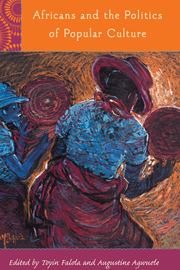Book contents
- Frontmatter
- Contents
- List of Illustrations
- Preface
- Introduction
- 1 From Primitive to Popular Culture: Why Kant Never Made It to Africa
- Part One Politics of Culture in Habitual Customs and Practices
- 2 Popular Culture of Yoruba Kinship Practices
- 3 Justice from Below: Cultural Capital, Local/Global Identity Processes, and Social Change in Eastern Niger
- 4 Popular Culture and the Resolution of Boundary Disputes in the Bamenda Grasslands of Cameroon
- 5 Reverse Mission or Asylum Christianity? A Nigerian Church in Europe
- 6 Performing Pop Tradition in Nigeria: From Yorùbá Bàtá to Bàtá Fújì
- Part Two Politics of Culture in Popular Representations: Films and Performances
- Part Three Politics of Culture in Popular Texts
- List of Contributors
- Index
- Rochester Studies in African History and the Diaspora
6 - Performing Pop Tradition in Nigeria: From Yorùbá Bàtá to Bàtá Fújì
from Part One - Politics of Culture in Habitual Customs and Practices
Published online by Cambridge University Press: 12 September 2012
- Frontmatter
- Contents
- List of Illustrations
- Preface
- Introduction
- 1 From Primitive to Popular Culture: Why Kant Never Made It to Africa
- Part One Politics of Culture in Habitual Customs and Practices
- 2 Popular Culture of Yoruba Kinship Practices
- 3 Justice from Below: Cultural Capital, Local/Global Identity Processes, and Social Change in Eastern Niger
- 4 Popular Culture and the Resolution of Boundary Disputes in the Bamenda Grasslands of Cameroon
- 5 Reverse Mission or Asylum Christianity? A Nigerian Church in Europe
- 6 Performing Pop Tradition in Nigeria: From Yorùbá Bàtá to Bàtá Fújì
- Part Two Politics of Culture in Popular Representations: Films and Performances
- Part Three Politics of Culture in Popular Texts
- List of Contributors
- Index
- Rochester Studies in African History and the Diaspora
Summary
Introduction
Lead vocal: Émi láiyé!
Second vocal: Émi! Émi!
Lead: Émi láiyé!
Émi láiyé mi!
Second: Émi! Émi!
Lead: Émi láiyé.
Émi láiyé mi!
Lead vocal: It's me, alive in the world!
Second vocal: It's me! It's me!
Lead: It's me alive in the world!
It's all about me!
Second: Me! Me!
Lead: It's always me.
Me, alive in the world!
Wasiu Alabi's catchy melody and lyrics, consisting of every possible combination of the words émi (me), láiyé (alive in the world), and mi (me), became a popular choral refrain with the cohort of fújì-loving bàtá artists in the rural town of Erìn-Oṣun, Nigeria, during the late 1990s. Whenever I joked with these artists about their potential stardom as globally renowned fújì front men, they would try to out-perform each other by singing and dancing some version of the tune, “Émi láiyé mi.” Not only are the words and melody easy to remember, but they represent a significant shift in the style and content of performance for extended families of drummers and dancers who specialize in traditional Yorùbá Bàtá. “It's All about Me” gave the young artists the creative license to transform their traditional artists' identities into pop culture personae (see fig. 6.1). However, these young artists' fathers criticized their children's “all about me” culture for its diversion from tradition, àṣà ìbíle. What can we learn from this generation gap in a rural Nigerian town during the late 1990s?
- Type
- Chapter
- Information
- Africans and the Politics of Popular Culture , pp. 133 - 164Publisher: Boydell & BrewerPrint publication year: 2009



